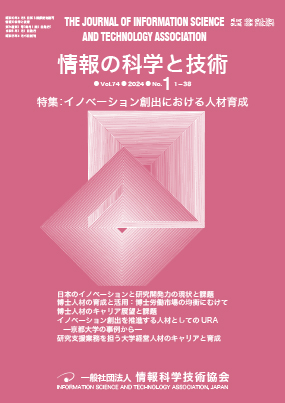
- |<
- <
- 1
- >
- >|
-
Michitaka IMAMITSU2024Volume 74Issue 3 Pages 79
Published: March 01, 2024
Released on J-STAGE: March 01, 2024
JOURNAL FREE ACCESS -
Tetsuya SAKASHITA2024Volume 74Issue 3 Pages 80-85
Published: March 01, 2024
Released on J-STAGE: March 01, 2024
JOURNAL OPEN ACCESSBlockchain technology, as typified by Bitcoin, which was born from the verification of the centralized financial system triggered by the Lehman Shock, overlaps with the situation of centralized Internet use that relies on platforms (Web 2.0), and its use is expanding as a technology suitable for Internet use in a decentralized environment (Web 3). The use of blockchain technology is expanding as one of the technologies suitable for Internet use in a decentralized environment (Web3). Blockchain technology implements elliptic curve cryptography (ECC) and has a strong security mechanism. On top of that, tokens have made concrete progress in their application beyond cryptographic assets, and NFT (non-substitutable tokens) have enabled the creation of scarcity value for digital data and the guarantee of uniqueness. The battle for leadership in social implementation of these technologies has begun around the world, and Japan must not miss the boat.
View full abstractDownload PDF (581K) -
Hiro Taiyo HAMADA2024Volume 74Issue 3 Pages 86-91
Published: March 01, 2024
Released on J-STAGE: March 01, 2024
JOURNAL OPEN ACCESSSince the advent of Bitcoin, attempts have been made to utilize its underlying technology, blockchain, in various fields. Decentralized Science (DeSci) applies blockchain to science and has gained attention. In Japan, the DeSci.Tokyo Conference 2023 held, and initiatives are underway. In this article, we first explain the background and efforts of decentralized science. Next, we describe the activities of DeSci.Tokyo, a hub in Japan. We will also cover the areas that DeSci.Tokyo focuses on and its future activities. In doing so, we will share the ecosystem built by DeSci.
View full abstractDownload PDF (2633K) -
Nobuko MIYAIRI2024Volume 74Issue 3 Pages 92-98
Published: March 01, 2024
Released on J-STAGE: March 01, 2024
JOURNAL OPEN ACCESSAs digital transformation forces in today’s society to change, the need for digital identity has become an important international discussion. New approaches to digital identity frameworks, such as self-sovereign and decentralized models, are influencing social and economic infrastructures, and the scholarly communication ecosystem is not immune. This article outlines the basic concepts of these new digital identity models in contrast to more traditional ones, and illustrates what benefits could be brought to researcher identifiers by adopting such models.
View full abstractDownload PDF (602K) -
Kenichi KAWASHIMA, Asahi HASEBE, Shiho KONDO, Akiyo SATO, Yuto KANEKO2024Volume 74Issue 3 Pages 99-104
Published: March 01, 2024
Released on J-STAGE: March 01, 2024
JOURNAL FREE ACCESSCultural Institutions face challenges to pass on culture and arts to the future generation, especially in terms of financial and human resources. To tackle this challenge, we believe that concept of Web3, with its characteristics such as decentralization, permissionless, native payments and trustless, may enable a new community to support this in terms of human activities. This paper discusses the potential of Web3 as a public digital platform that can be used by cultural and artistic inheritance activities, and the hypothesis of creating community activities motivated by contribution and support using it. In addition, we would like to report on the results of a Proof of Concept conducted at the Vatican Library to create a supportive community using NFT.
View full abstractDownload PDF (5476K) -
Michitaka IMAMITSU2024Volume 74Issue 3 Pages 105-107
Published: March 01, 2024
Released on J-STAGE: March 01, 2024
JOURNAL OPEN ACCESSDownload PDF (307K)
-
Namiko MITSUMORI2024Volume 74Issue 3 Pages 108-113
Published: March 01, 2024
Released on J-STAGE: March 01, 2024
JOURNAL FREE ACCESSDownload PDF (1005K) -
Katsuyuki HIRAI2024Volume 74Issue 3 Pages 114
Published: March 01, 2024
Released on J-STAGE: March 01, 2024
JOURNAL OPEN ACCESSDownload PDF (244K) -
INFOSTA West Japan Committee2024Volume 74Issue 3 Pages 115-116
Published: March 01, 2024
Released on J-STAGE: March 01, 2024
JOURNAL OPEN ACCESSDownload PDF (563K)
-
Misae MATSUNO2024Volume 74Issue 3 Pages 117
Published: March 01, 2024
Released on J-STAGE: March 01, 2024
JOURNAL OPEN ACCESSDownload PDF (277K)
-
2024Volume 74Issue 3 Pages 118-119
Published: March 01, 2024
Released on J-STAGE: March 01, 2024
JOURNAL FREE ACCESSDownload PDF (199K) -
2024Volume 74Issue 3 Pages 120-122
Published: March 01, 2024
Released on J-STAGE: March 01, 2024
JOURNAL FREE ACCESSDownload PDF (347K) -
2024Volume 74Issue 3 Pages k-1-k-6
Published: March 01, 2024
Released on J-STAGE: March 01, 2024
JOURNAL FREE ACCESSDownload PDF (1913K)
- |<
- <
- 1
- >
- >|